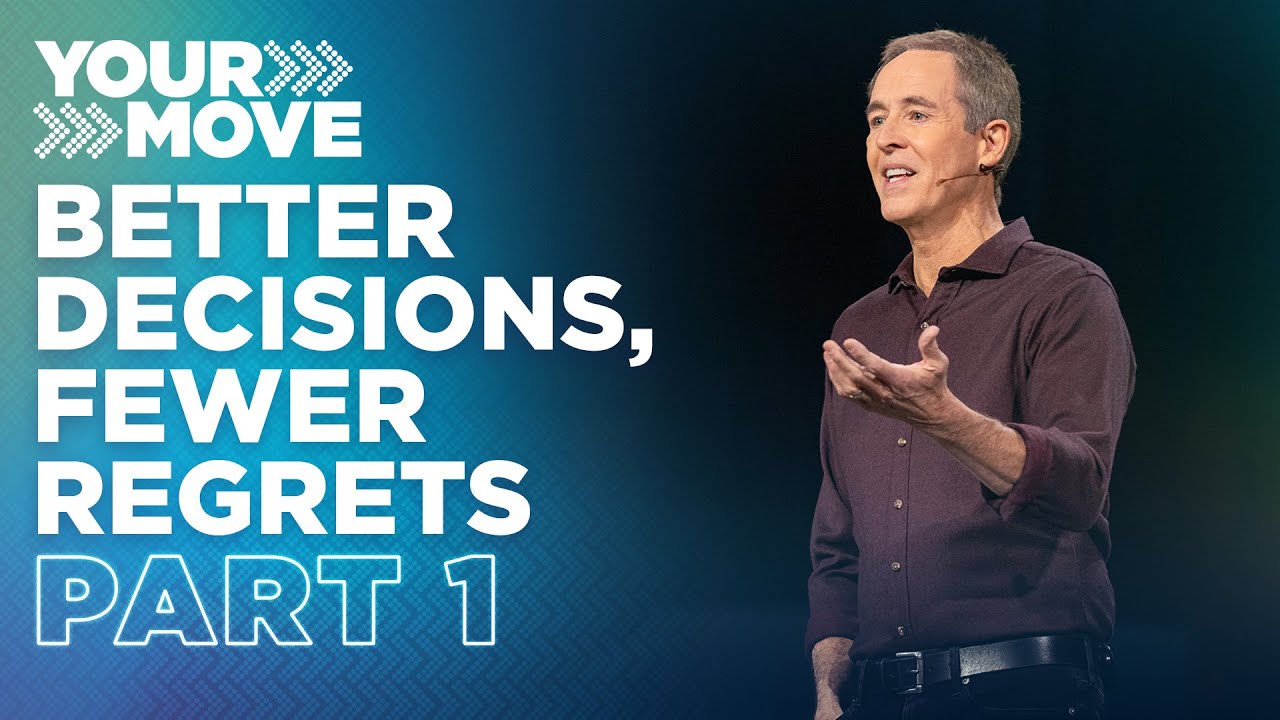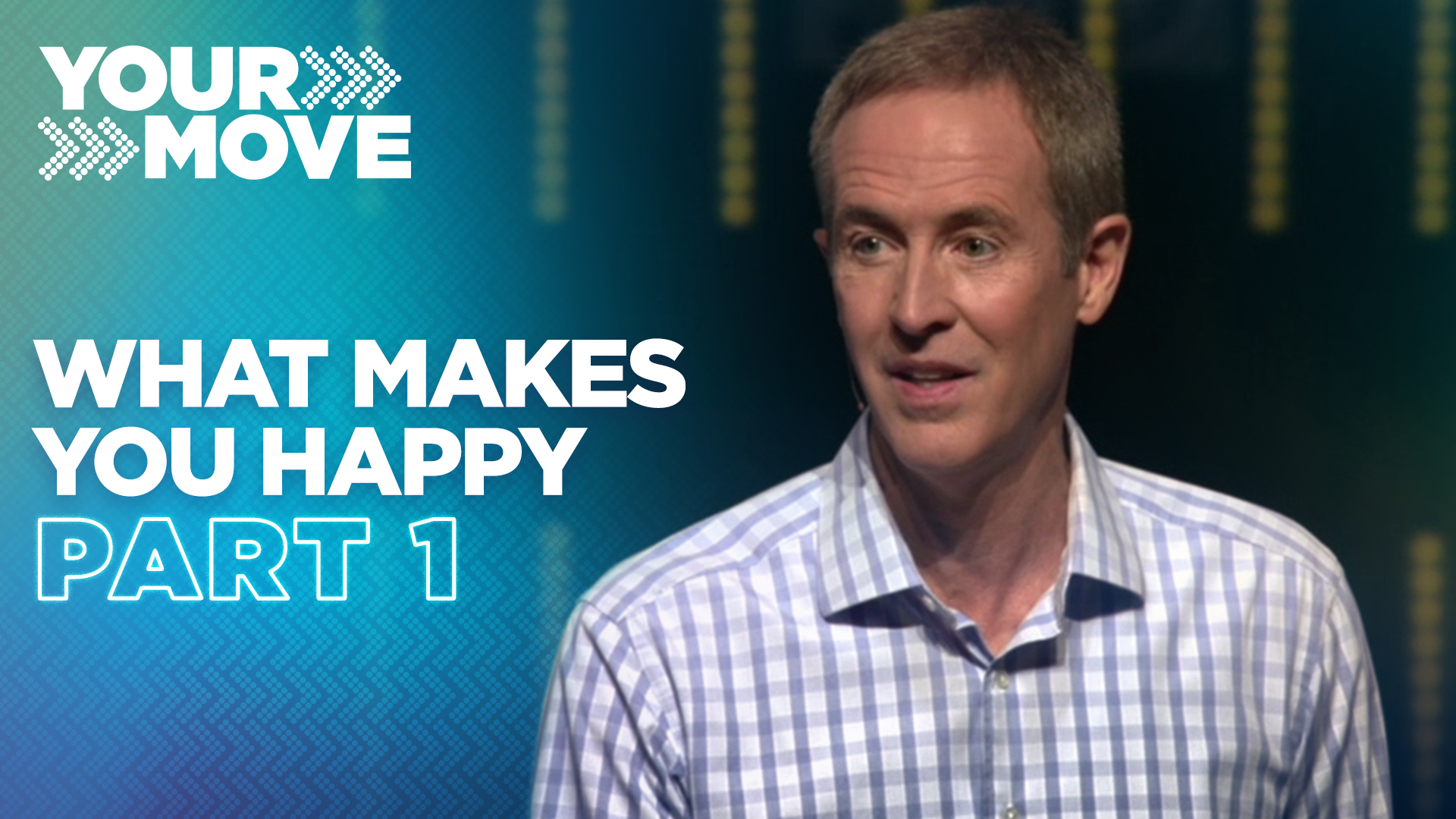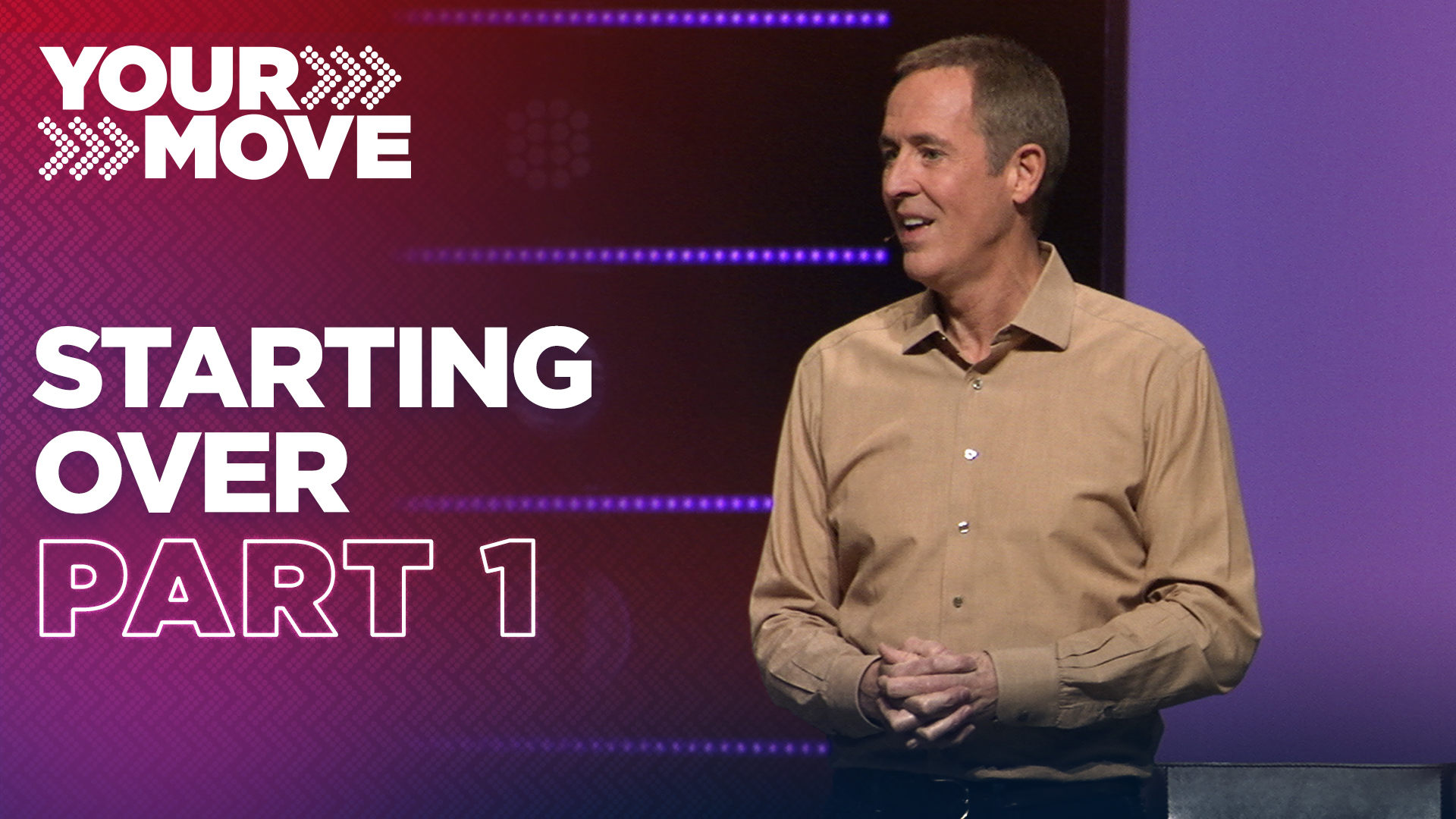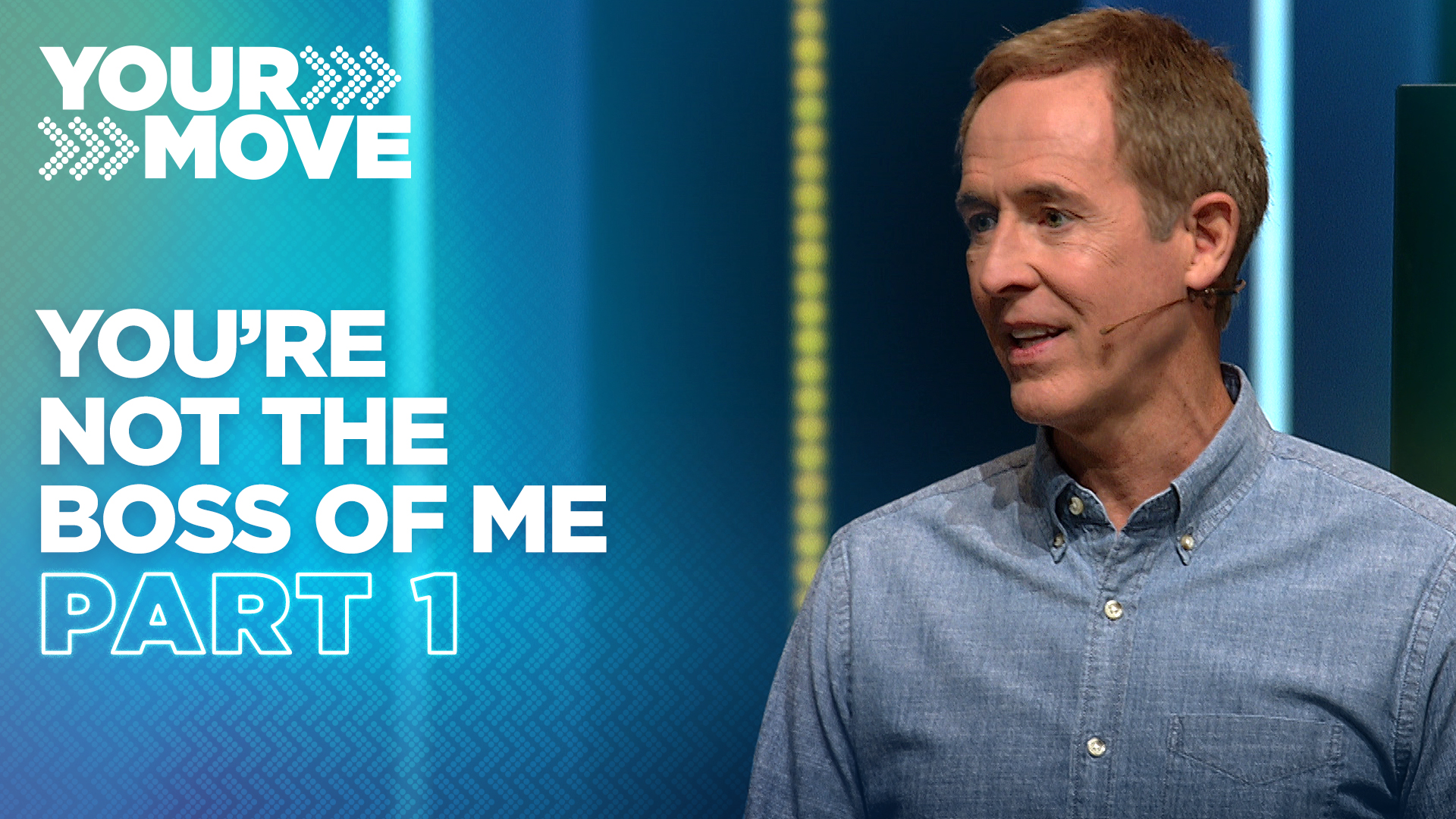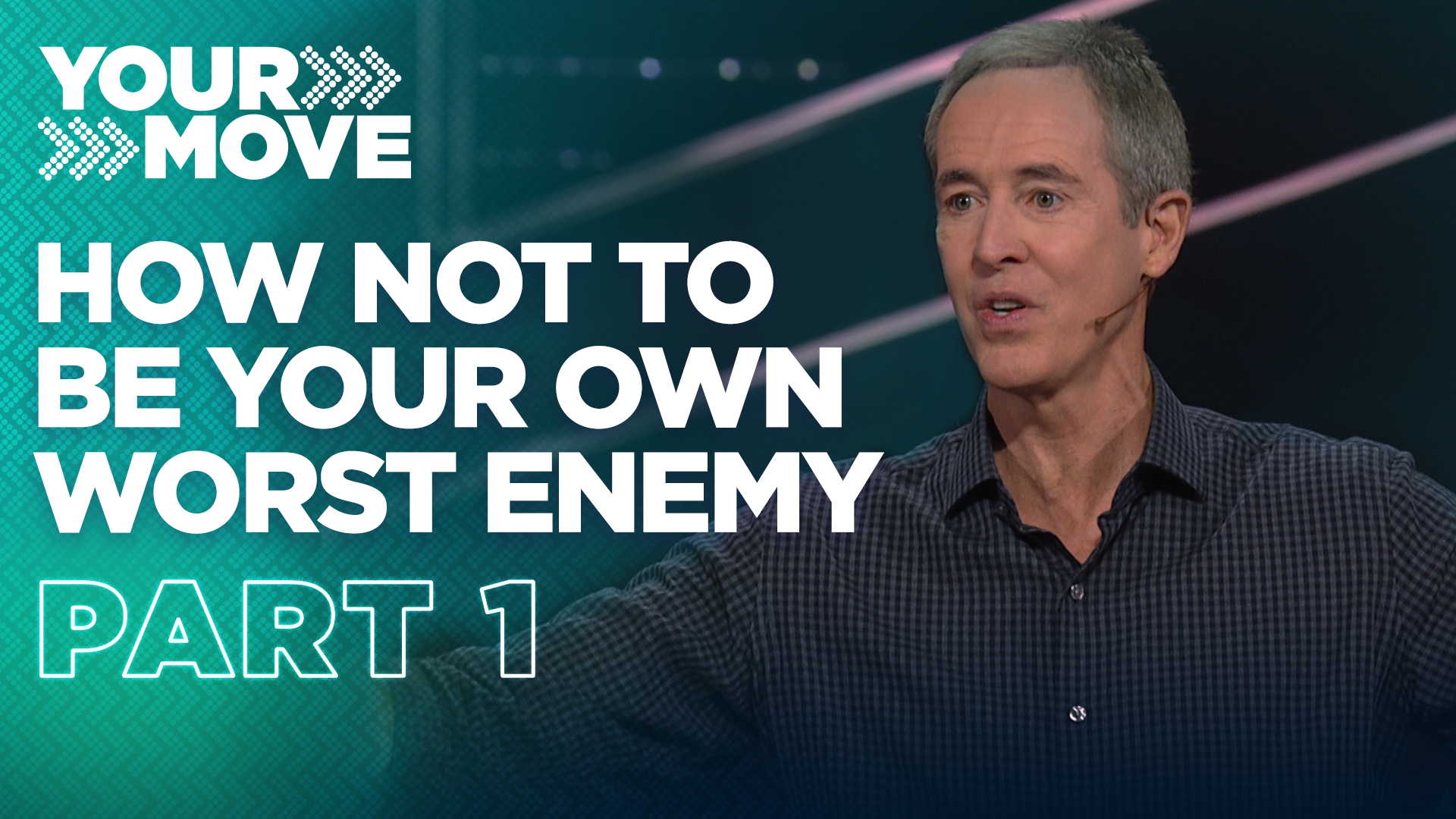Sometimes the people closest to us are the ones who see the mistakes we’re about to make—mistakes that could be avoided if only they said something. So how do we speak up when there’s something worth saying?
- When presented with a difficult situation, do you tend to dive right in or get as far away as possible? Explain.
- “If you don’t deal with your demons, they go into the cellar of your soul and lift weights.” Through your past experiences, have you found this to be true? Explain.
- Describe a time when loving someone you care about didn’t feel like love at all.
- Has someone ever taken a big risk by confronting you about something? If so, how did it go?
- Is there someone in your life right now who needs to hear from you? How could you prepare for this difficult conversation?
NOTE: The following content is a raw transcript and has not been edited for grammar, punctuation, or word usage.
So today, we are wrapping up the series, and we’re in part six of “You’re Not the Boss of Me”. And if you’ve not been with us, the subtitle is “How to Say “No” to the Emotions that Compete for Control”, because all of us have certain emotions that compete for control of our mouth and our mood. And Jesus said, Jesus said that what’s on the inside of us eventually comes on the outside of us. And consequently, we need to not simply monitor what’s going on in our… With our behavior, because all of us are pretty good at monitoring our behavior. We need to develop the habit, we need to develop the habit of monitoring our hearts.
While I was doing this series, I listened… I was listening to Tim Ferriss’ podcast, and he was interviewing artist, Amanda Palmer. And she talked about a conversation she had with a friend, and she quoted her friend… And I don’t think she gave her friend’s name, so I don’t know who said this, but this was a friend of Amanda Palmer. And I love this quote. Here’s what he said that she remembered that I wrote down: If you don’t deal with your demons, they go into the cellar of your soul and lift weights. That is a great quote. The only thing I don’t like about it is that I didn’t come up with it myself.
Now, this is so powerful and the imagery is so true, right? If you don’t deal with your demons, those things on the inside of you, not literal demons, but the stuff that just… It got inside of you because of something that happened in your childhood or something that happened during high school or something that happened to you, and you’re just dealing with that stuff. He so rightly said, if you don’t deal with that stuff, it doesn’t go away, It gets stronger and stronger and stronger, and eventually, it impacts future relationships as well.
And one of the ways that we identify what’s going on in the cellar of our soul, and one of things that… One of the ways we become aware that there’s stuff in us that’s gonna come out of us that we need to deal with before it does, is by paying attention to the emotions that compete for control of our moods and our mouths. The emotions that compete for control of our moods, that is dark times where we just go inward or/and our mouth.
So, in this series, if you’ve been tracking along, we’ve talked about envy, we’ve talked about guilt, we’ve talked about anger, last week, we talked about fear. And generally speaking, those things are pretty easy to spot.
But today, I wanna spend a few minutes going in a different direction. And I wanna talk about the destructive emotions that actually disguise themselves as virtues. They disguise themselves as good things, they disguise themselves as compassion, as sympathy, as care, concern. They can even disguise themselves as love. Because what you know because you’re an adult is this: That what we consider nice and being nice sometimes isn’t really all that nice, and what we consider caring doesn’t always feel caring. And love, if you’re really gonna love somebody, it doesn’t always feel loving. And what love actually requires of us, what love actually requires of us can feel like anything but love.
Now, if you’re a parent, you know this, because at some point, every parent has to make their child hate them, or just about hate them, right? And every… If you’re gonna be a good parent, at some point, you have to do something that makes your child so mad, they may even say at some point, “Mom, I hate you.” Or, “Dad, I hate you.” And you have to be willing to face that fury and deal with that fury in order to do the right thing. And in that moment, it doesn’t feel like love and it doesn’t feel like care, it feels like the opposite.
But here’s where this interfaces with our lives as adults: Fear of rejection, discomfort with conflict, some of you are conflict-averse, apprehension around confrontation, these are emotions that basically disguise themselves as what? As sensitivity and concern, when in fact, they’re just fear, discomfort, and apprehension. And I already know the answer to this question, but I’ll ask it anyway, do you want fear and discomfort and apprehension to be the boss of you? No.
And here’s the challenge, especially, for those of us who are Jesus followers, in order to love other people, in order to be for other people what other people need us to be for them, as we’re gonna see in a second; in order to be for other people what Jesus actually calls and commands us to be, we have to recognize fear for what it is, discomfort for what it is, our fear of engaging in things that are uncomfortable for what it is. Call those emotions out and say, “You know what, fear, you’re not gonna be the boss of me. Apprehension, you’re not gonna be the boss of me. And so I’m gonna do what I need to do for the sake of this other person, even though it doesn’t feel good to me right now.”
And there’s another emotion that cloaks itself in the mantle of kindness and care and sensitivity, and it’s this one, it’s indifference. This is a terrible thing. It’s not so much a feeling, it’s not so much an emotion, as a lack of a feeling or a lack of emotion where there should be one, it’s a lack of concern where there should be concern. And the thing is we rarely spot indifference in our lives, because it’s so embarrassing. Nobody, nobody is gonna own indifference, very few people are gonna say, “You know what, he’s getting himself in a big mess relationally, but I don’t care what happens to him.” “If that keeps going on in their marriage, it’s gonna destroy their marriage, but I don’t care what happens to them.”
What we say is this: I see what’s going on, but I shouldn’t interfere. So I’m gonna pretend like I’m just being sensitive, but in pretending to be sensitive you are cloaking, you are hiding fear or indifference. “Oh, you know what, they haven’t even asked for my input, so I’m just being sensitive. I’m gonna wait until they ask. I’m being sensitive.” No, you’re not being sensitive, you are hiding your fear and your discomfort with sensitivity. Oh, here’s our big one right? “Well, that’s none of my business. Yeah, they’re gonna regret that financially. You know what, he’s gonna wish he never met her, ultimately. Yeah, that’s not gonna work out for him professionally, but you know what, it’s none of my business.”
So here’s the question, do you want indifference to be the boss of you? Do you wanna be so emotionally neutral because, “Hey, it’s none of my business. They didn’t ask me,” that that becomes the boss of you? Or let me flip it around this way, when you need someone to mind your business because you’re not doing such a good job minding your business, are you going to want those people, those friends, to give into fear, and discomfort give in to indifference? Are you gonna want them to step up and interfere in your business if it keeps you from making things worse or keep you from making a big mistake? And the answer is, even though it is so uncomfortable, we want people to step up and speak into our lives, even when it’s uncomfortable for them, we want people who are willing to say to fear and discomfort, “You are not the boss of me. Indifference, you are not the boss of me. I care, and it’s because I care I’m sensitive, and it’s because I’m sensitive that I’m gonna step in and say what will appear to be the insensitive and the uncomfortable thing.”
Now, if you’re a Christian, if you’re a Jesus follower, you can’t listen to those unhealthy voices because there’s another voice that’s already spoken, the voice of the Good Shepherd, whose instructions don’t always feel so good. In fact, one day Jesus is speaking, and I’m gonna give you context in a minute, but here’s kind of His bottom line in case you have to leave early. Okay, here’s what Jesus said, “Hey, if your brother or your sister or somebody you know, this is a relationship, it’s not your literal brother or sister, but somebody you’re in community with; if your brother or sister sins, go and point out their fault.” To which you may conclude, you know what, that’s reason enough right there to never, ever follow Jesus, because I’m not ever ever gonna do that, right? I mean, let me ask you a question, “Who does that?” People who care. People who decide discomfort’s worth dealing with if that’s what it takes to love you.
So what I wanna do, because this is so stark and in your face, I wanna back up a few verses and I wanna give you the context, because Jesus takes his audience on a little bit of a journey through two or three really important things, and then He finally lands the plane around this whole idea that we are supposed to confront people in sin. And as harsh as that sounds, when you hear the whole conversation, at the end you kinda go, “You know what, that actually makes a lot of sense even though I don’t feel like doing it and even though it is so uncomfortable.” So here’s how the conversation went. At that time, and Matthew was there for all of this, at that time the disciples came to Jesus and they asked a question, they said, “Jesus, who is the greatest in the kingdom of heaven?” And the Kingdom of Heaven wasn’t Heaven out there somewhere, the Kingdom of Heaven was what Jesus was introducing to earth, a brand new value system that was in conflict with the kingdoms of this world.
And he says, “In this kingdom that you’re establishing who’s the greatest?” And of course, the apostles are thinking or hoping he’s gonna point to them and say, “Well, somebody like Peter, maybe somebody like Matthew.” And he called the text… Matthew says He actually called a child to them, and He placed the child among them. So He brings… He sees a kid in the audience and says, “Could you come up here a second?” Or asked his mom or dad, “Would you bring your son or daughter up here?” “I tell you, unless all of you guys,” these are his closest followers, “unless you change and you become like little children, you will never even enter the kingdom of heaven.” And He’s got their attention.
And then He begins this teaching that’s gonna land with this uncomfortable command. He says this, “If anyone, if anyone causes one of these little ones,” and now He’s expanding the audience beyond this single child to anyone who has begun following Him, “If anyone causes one of these little ones who believe in me,” that’s how and why we know He’s talking now about the adults that had begun to follow Him. “If anyone causes one of these new people, these little ones who believe in me to stumble,” that is, to fall down, to get tripped up, to go out of bounds, to get thrown off course. In other words, if anybody that comes along and throw something down in front of them that causes them to stumble or go backwards or lose their way, it would be better for that person to have a large millstone hung around their neck and to be drowned in the depths of the sea.”
“It would be better to take a stone that’s the shape of a wheel that a donkey would push around and around and around, to have that hung around a person’s neck and to drop them into the sea.” Hyperbole. He’s making an extreme point, He’s making an extreme case because He’s making an extreme point, He wants everybody’s attention. And He says this, He says, “Woe.” I love it when He says, “Woe.” It’s like attention please. “Woe to the world because of the things that cause people to stumble!” In other words, things are gonna come along in our lives that cause us to get tripped up, but such, He says, “Such things must come, but woe to the person through whom they come!” Now this is so important for all of us.
He says it’s one thing for somebody to get tripped up because something they couldn’t help or something came along in life; there was an illness or they lost their job or something they had no control over happened, and they, in dealing with it, they kinda lost their way for a while. He said, “You know what, that kind of stuff’s gonna happen, but woe to the person that is the cause for a person to actually throw something in someone’s way or to get in someone’s way or to cause someone to lose their way.” This was Jesus’ way of saying the way we say it is, “Hey, please don’t be somebody’s mistake.”
Don’t ever be somebody’s regret. Don’t ever trip somebody up in their marriage. Don’t ever trip somebody up with their reputation. Don’t ever trip somebody up in terms of their professional career or their progress. Don’t get in the way. Don’t be somebody’s mistake. Don’t be somebody’s regret. And how big of a deal is this whole stumbling thing to Jesus? He keeps going. He says this: Now, we’ve talked about there are things you can’t avoid that might cause you to stumble. We’ve talked about people who cause people to stumble.
And now he talks about us getting in our own way when it comes to causing people to stumble. Here’s what He says, and this is extreme, and don’t leave early, “If your hand or your foot causes you to stumble, cut it off,” here’s the keyword, “and throw it away.” It’s like okay, literally? No, don’t leave early. Not literally.
Here’s His point: If there is something you have control over that has the potential to trip you up or cause you to stumble, deal with it. And if your eye causes you to stumble, gouge it out, and again, here’s the word, throw it away. In other words, if there’s anything in your life that has the potential to get you off course, to create a regret, to create a season of your life that you’ll wish you could go back to and re-live, if there’s anything you have control over right now, that could potentially trip you up or is tripping you up, He says, “Get rid of it.” And the reason He uses such extreme measures is because God loves you so much, He would do anything to keep you from being tripped up, stumble, and fall out of bounds, in terms of your moral life, your financial life, your marriage life, your relationship life, any area of your life. He says, “This is a big deal, because you’re a big deal. This requires extreme response because of how much I love you.”
And then He says this, “It is better for you to enter life without one eye than to have two eyes and to be thrown into the fire of Gehenna.” Now, the key word here, He’s doing a little linguistic thing around this word “thrown”. Here’s what He’s saying, “It is better for you to throw things out of your life than for your entire life to be thrown into chaos. It is better for you to take extreme measures while you are still in control before your life spins out of control, and you find your entire life in chaos.” The word “Gehenna” is actually a literal place in the south side of Jerusalem; and hundreds of years before Jesus was teaching the Jewish, the Israelite people, or the Hebrew people at the time, they actually sacrificed their own children to Moloch, who was a pagan God, and God judged the nation. So this area of Jerusalem became a place that was considered cursed. Eventually it became the garbage dump, and there was always fires and things being burned all the time. So this was a literal thing. And Jesus was making a very important point. It is better to throw some things away from your life than to have your life thrown into chaos. It is better to throw whatever you can away from you, than to have your entire life thrown into chaos. Because when your entire life is thrown into chaos, it becomes hell on earth, doesn’t it?
Have you ever stumbled? Yeah, you’ve stumbled. And once you’ve stumbled and something becomes an addiction, once something becomes irreversible, once something becomes legal that you wish you’d never gotten involved in, and now you can’t get out of it without doing something illegal, isn’t it true that you wish you could go back to the time when it began and throw something out of your life? There’s some of you that wish you had thrown away a phone number, but you didn’t. And you didn’t throw away the phone number, and now your life is thrown into chaos, and you wish you could go back and throw away a phone number. You wish you could delete a text, but instead of deleting the text, you responded to the text. You responded to the text, and eventually it threw your life into chaos, and you wish you could go back and throw away the text, instead of having your whole life thrown into chaos. I could go on and on. Some of you wish you had never taken that first drink. Instead of taking it, you wish you had thrown it away. If you could go back, you would throw it away because it is better to throw that away than for your whole life to be thrown into chaos through an addiction to alcohol or an addiction to anything.
So, why does Jesus say, “Take extreme measures”? Because He loves you, extremely, and He cares for you. And again, every parent here understands what we would say to our own children in the same capacity.
And then Jesus switches gears just a little bit and He says this, and I love this, He says this, “What do you think?” Wouldn’t it be cool to be standing there with Jesus and He’s like, “So what do you think?” And if you’re smart, you don’t say anything ’cause you’ll be wrong. You just go, “I don’t think I’m gonna share my thoughts right now, and you probably already know my thoughts anyway.”
So Jesus starts this whole conversation off. It’s so cool. He says, “Okay, you guys, what do you think?” And then, He tells a very familiar parable that you have heard before, but probably not in this context. Because one of the things that’s important to remember is this: Jesus taught for about three years and he repeated many of these parables and many of these stories over and over and over and over to make sure the people within Judea and Galilee got it. So now He takes a parable that you’ve heard in one context, He puts it in a different context. Here’s what He says, He says, “If a man owns a hundred sheep,” which to us is just odd, but to them, that was the world they lived in. “If a man owns 100 sheep and one of them wanders away,” or to use the word He’s gonna use throughout this teaching, “if one of them stumbles away, if one of them stumbles off, if one of them gets lost, or loses its way, will the man, or will the shepherd not leave the 99 on the hills and go look for the one that wandered off?” And everybody in Jesus’ audience is like, “Yeah, that’s what you do, you leave the 99 and you go look for the one that stumbled away.” And He says this, “And you know what happens next. If he finds it, truly, I tell you, he is happier about that one sheep than about the 99 that did not wander off.”
“In the same way,” He says, “In the same way, your Heavenly Father is not willing that any of these little ones should stumble, should perish, should be lost to Him.”
Now, if Jesus would have stopped right here, this is so good, isn’t it? you don’t want people to stumble ’cause you love us, that’s great. So if I stumble away, you are gonna come looking for me. Thank you, thank you, thank you, Jesus. Give me a J, give me an E. This is so great. And we’ll see you later, Jesus. Thanks for that teaching.”
And Jesus says, “No, no, we’re not done. Come back. Because you’re my followers, right?” We’re like, “Yes, we’re your followers.” He says, “Well, you’re involved in this process.” “No, no, we don’t wanna be involved in the process. We want you to do it.” He’s like, “No, it’s not how it works. You’re involved in the process. So, when you see someone you know, when you see someone you care about, when you see someone you love stumble, fall, get tripped up, if your brother or sister,” because this is the next Verse, “If your brother or sister sins, wanders off, gets tripped up, you go, you go and you point out their fault.” To which we say, “No, no, no, no. We don’t go, we pray. We just pray. We pray that somebody would come along, not us, would come along. We pray that you would do a miracle. We pray that you would send a dream, a vision that something would happen.” Jesus says, “No, don’t pray, go. Don’t pray, go.” I made up the “Don’t pray,” He said, “Go. You go.”
Because we default to pray. In fact, we don’t just pray, we gossip as a prayer request. Like, I just need you to pray for my friend, Bill. He’s having a real hard time. I’m not gonna give you his last name, but it’s Bill, and all of you know him. Last name starts with an “F”. Anyway, I don’t wanna go any further than that. Let’s just pray for Bill. And Jesus is going, “No, you don’t pray. You go.” But that is so uncomfortable. I just wanna be… I wanna be sensitive. I wanna give him his privacy. Jesus is going, “You’re not being sensitive. You’re being insensitive. I want you to go whether you feel like it or not. And don’t tell anybody. And don’t share a prayer request.” He covers that. He says, “You just go between the two of you, you just show up.” And to our responses, “But it’s none of our business, it’s none of my business,” and Jesus’ response is, “I just made it your business. Their business is your business, because their business is my business, and I love them, and I’m sending you.” We’re like, “Oh, I don’t know if that’s the loving thing to do.” It’s the most loving thing to do.
He goes on, “If they listen to you, here’s some good news, if they listen to you, you have won them over. Whenever they tell their story, they’ll bring up your name and say, “Then Sally showed up, then Bart showed up, then Phyllis showed up or whatever your name, and then Brandy showed up, and we had this awkward conversation. And forever and ever, you will be a permanent positive part of their story, right? We’re like, “Good. Can we stop there?” Jesus is like, “No, ’cause it rarely works out like that.” [laughter] There are very few happy endings to going to your brother or your sister to point out their sin. Very few times are they gonna go “You know, you’re right, thank you.” [laughter] But if they will not listen because they probably won’t, if they will not listen, well, to which we go, “Okay, if they will not listen, okay, I’ve done my part, right? I did what you said, I confronted them, it was so awkward. I’m not sure they’ll ever speak to me again, but we’re done, right? And I get extra credit, like, I’m the best Christian in my whole church, I don’t have to go to church for a month, because I did what very few Christians will do, right?”
Jesus is like, “No, I want you to go back, and this time I want you to take some people.” It’s like, “What? I mean Jesus, give it a rest. I did the most unusual thing. I poked my nose in their businesses.” “No, take a couple of people with you that know them, because every matter has to be established by the testimony of two or three witnesses.” What is this, court? I mean, who does this? Seriously, who does this? Good shepherds. Your Heavenly Father. People who aren’t gonna hide behind sensitivity, and I’m just giving them space, and I’m just gonna pray when in fact you’re just scared or indifferent or just too worried about what might happen, the consequence, that’s who does that. If they still refuse to listen, you take it another step. Tell it to the assembly.
Now, in your English Bibles, you’ll find the word church here, which was Ecclesia, which should never have been translated church, but that’s another story for another day. The word actually means assembly, and besides, by the time when Jesus was teaching this, there was no church.
He says, “Look, if this person continues to wreck and ruin their life and maybe wreck and ruin other people’s lives with their behavior, you actually take them to the community of people that know them and care about them and you confront them as a community.” The people who love them and can restore them.
“And I know you don’t think it’s any of our business, but you know what, we love you too much for it not to be our business.” And then, Jesus says, “And then if they refuse to listen, even to the assembly, treat them as you would a Gentile or a tax collector.” What this is saying, this is so important is, see, when you confront somebody, because there’s something going on in their life where they’re hurting themselves, the assumption is that they see the world the way you do. Every time you confront someone, you’re assuming a shared worldview, you’re assuming some shared values. Jesus says, when it finally occurs to you that you guys aren’t even on the same page, that you don’t share the same world view, you don’t share the same values, then you choose a different approach, then you approach them as someone who doesn’t share your world view, and who doesn’t share your values, you back off.
Now it is not any of your business, because the assumption going in, it’s my business because we have common ground. Now, we get this completely the opposite, because when somebody’s doing something that’s gonna mess up their lives, or mess up their family, what we do is we don’t do anything. Jesus knows and says, “No, you immediately do something and then eventually you may not do anything.” But you don’t not do anything until you are sure, you know what, I went, we went, the community went. Clearly, they don’t care. Clearly, what we want for them is not what they want for them. Clearly, the way they view the world is not the way we view the world. So, we’re gonna begin treating them like somebody who just has a different world view. Do we love them? Of course, you love them, but you love them differently. Any questions? This is horrible, isn’t it? This is terrible. Why would Jesus do this? ‘Cause He loves you. So here’s the whole Verse, “If your brother or sister sins, go, point out their fault, just between the two of you, and if they listen, you have won them over. And you do this whether you feel like it or not.”
Now, Sandra and I, my wife and I, have done this so many times through the years. And I’ll tell you why, because many, many years ago when we were first married, there were two or three situations where we didn’t, and we saw what happened. And in one particular case, it was so… We were so overwhelmed with grief and remorse that we didn’t say something when we knew we needed to say something, but we were afraid and we backed off, and we would do what most people do. And we decided all those years ago, you know what, if it ruins relationships, if it ruins relationships, even with family, we will not be silent anymore, because love is not silent when there’s something that needs to be said. I have gotta tell you, we’ve done this so many times together and separately, it rarely works out well, it rarely goes well, rarely.
Every once in a while eventually someone will come back and thank us, but for the most part, it doesn’t go well. But we just decided love is not silent. Indifference, uncomfortable, that’s what’s quiet, that’s what’s silent. So please, don’t camouflage your fear, your discomfort, your apprehension, and your indifference with concern about making someone uncomfortable. “Woe,” Jesus says, “Woe to those who cause someone to stumble.” But blessed are those who go and favored are those who declare, “You know what fear, discomfort, apprehension, indifference, you are not the boss of me.” Love forbids me to remain silent. Love forbids me from minding my own business when I notice somebody else needs somebody to mind their business, especially when it’s somebody I know. So here’s what I wanna say to you, and then we’re gonna close. Because as I’m talking, [chuckle] I won’t ask you to raise your hand, somebody’s coming to mind, aren’t they? And you’re like, “Argh.”
Here’s what I just wanna say to you, “Please don’t let your emotions keep you from doing what you know you need to do. Somebody needs to hear from you, their future may depend on it. Somebody needs to hear from you, and there are no guaranteed outcomes. And you don’t do this because you know it’s gonna work, you do this because Jesus commanded you to do it. And the really cool, amazing thing about this principle is this, you see, as Christians… And if you haven’t heard me say this before, you’re gonna hear me say it over and over and over, and many of you’ve heard me say it before, thing is this, when Jesus… Right before Jesus was arrested, He said, “Guys, I’m just giving you one command, just one. This is it, you don’t have 10, just one command, and the command is this: You are to love others as I have loved you.” And that’s all this is, this is simply doing for others what God through Christ has done for us. This is just one more way to love the way that we have been loved.


